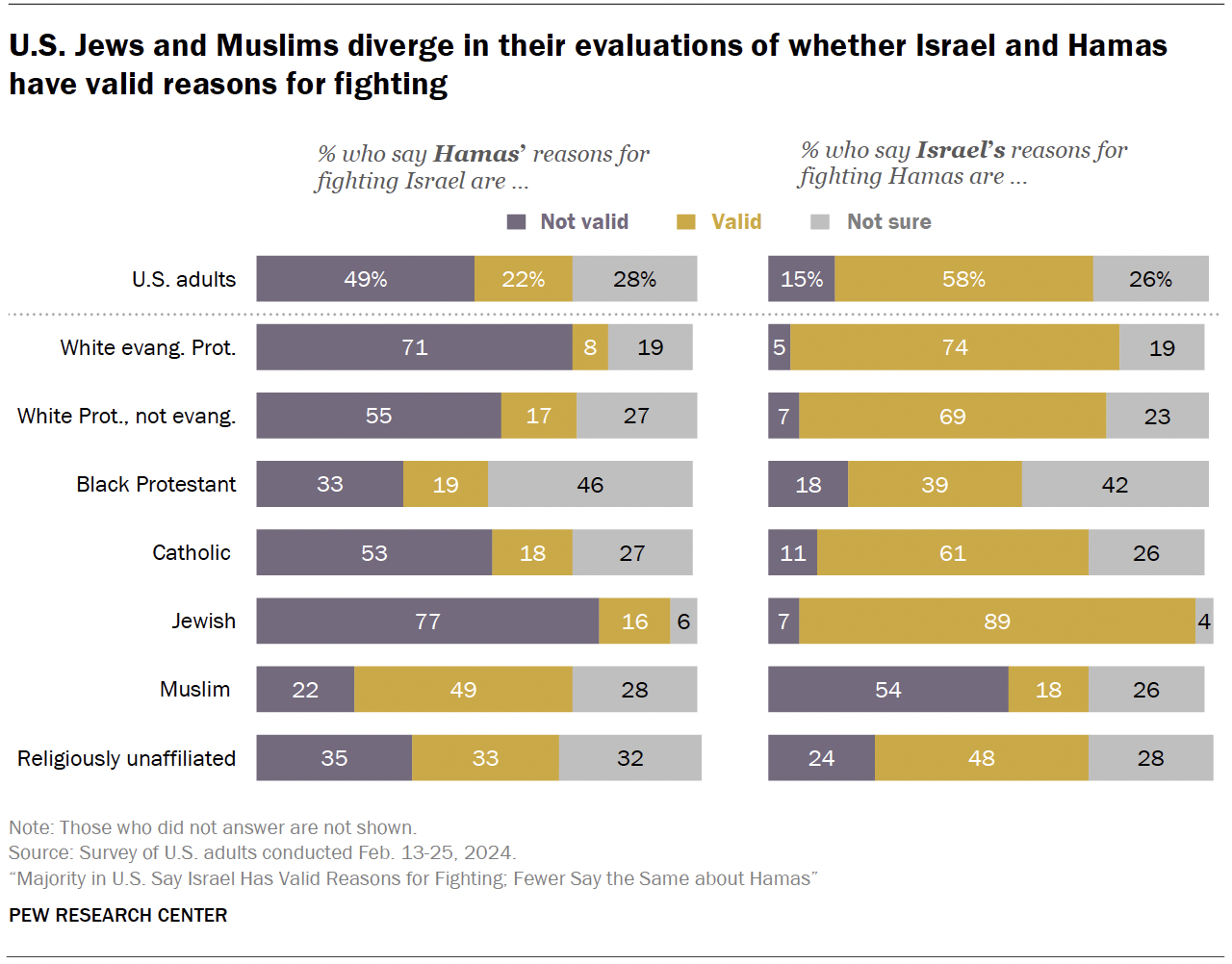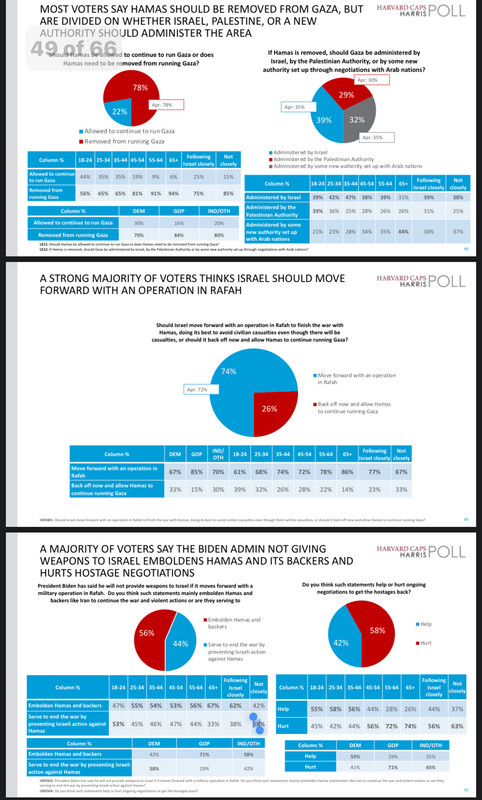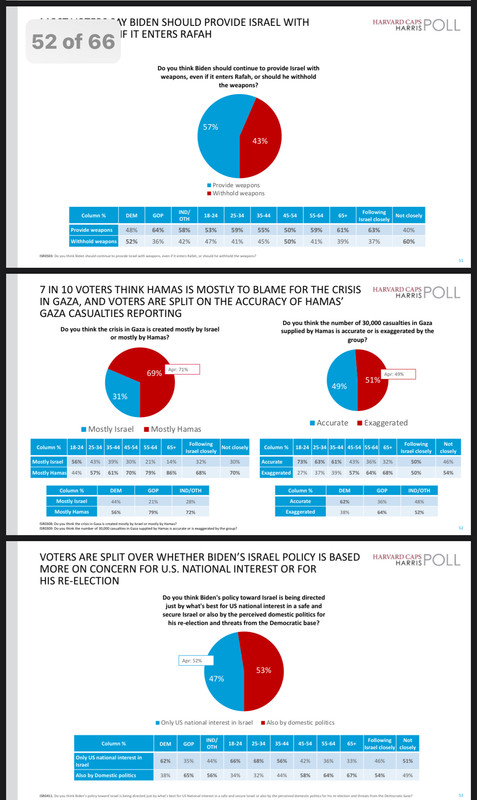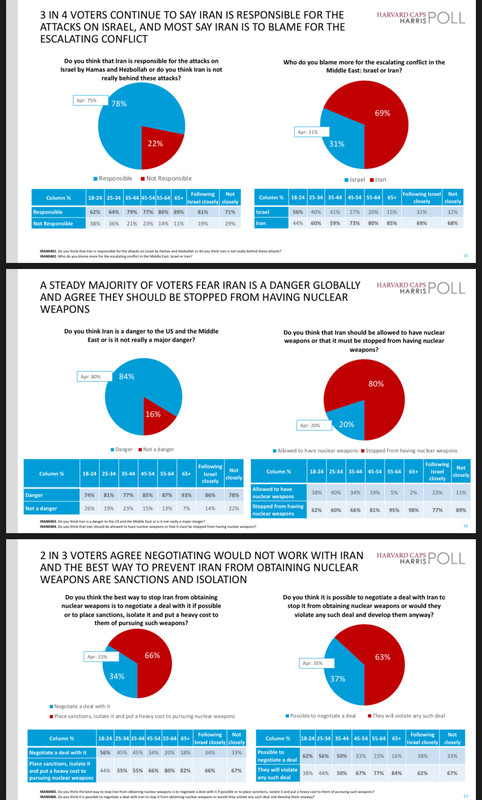aint gonna happen as long as gaza is a hamas stronghold. by no means is it justification for israel to keep murkin civilians, but if them ppl were capable of rising up and casting out hamas, they would be much better off.Hamas deserves to be dismantled arrested and tried.
Netanyahu deserves to be arrested and tried along with any IDF soldier or settler committing war crimes.
/conflict
You are using an out of date browser. It may not display this or other websites correctly.
You should upgrade or use an alternative browser.
You should upgrade or use an alternative browser.
74% of Americans support Israel.. 7 in 10 blame Hamas for the war. HARVARD POLL (right wing lean, poll may not be accurate)
- Thread starter Mister Terrific
- Start date
More options
Who Replied?If you completely ignore historical fact all the way up to present day injustice you can make that assumption........even then you have to acknowledge that the cut was made by a blade sharpened and honed by its own hand........I see you
No one is ignoring the historical context though. It's an undeniable fact that this round of the conflict was kicked off by October 7th.
Some of you crying ass nikkas need to miss me with this woe is Hamas bullshyt you're pushing.
And even worse is when y'all spin the above into somehow being pro-Israel when I can't fukking stand them either.
Richard Glidewell
Yall done tore all the bottom of ya shoes w/me!!!
You talk non chalantly about forever beef like it's a title for tat thing. If you can't admit that you don't have the full depth of understanding of a situation why double down as if you are being picked on. You say rounds as if the shyt ever stopped, I don't have a horse in the race, but people need to either educate themselves better........your reply clearly shows you have a set perspective and you are allowed that.........peaceNo one is ignoring the historical context though. It's an undeniable fact that this round of the conflict was kicked off by October 7th.
Some of you crying ass nikkas need to miss me with this woe is Hamas bullshyt you're pushing.
And even worse is when y'all spin the above into somehow being pro-Israel when I can't fukking stand them either.
Mister Terrific
It’s in the name
Israel funding has bipartisan support in congress that’s why. A lot of the things Biden supports do not. Other than that Biden has confirmed hundreds of liberal judges and forgiven billions in American debt. All of which will make American lives easier. You still don’t know how American government works?Dude literally breaking the law to fund Israel while saying his hands are tied on every democratic policy he was supposed to implement.
Also, the entire world hates us right now. Any educated person would easily denote our loss of power in the world directly to our cucking for Israel.
Please explain without getting hysterical like a white woman what laws Biden has broken in funding Israel? It’s literally US state policy and the presidents powers vis a vi foreign conflicts as commander and chief are near absolute. So even if congress and the American people were opposed to Israel Biden can side step that if he chooses.
That’s like the first baby step in 100 Shaq sized steps that need to be takenLiterally half of Europe is ratifying that Palestine is now a state and shall have an EMBASSY.

Purely performative. Palestine doesn’t even recognize itself.
Mr. Netanyahu’s life’s work has been largely built around the avoidance of a two-state agreement, even to the point of past support for Hamas intended to obstruct such an outcome. That seems unlikely to change, unless the United States can somehow triangulate Saudi normalization of relations with Israel, a vague Israeli verbal commitment to a process ending in two states and the end of the war in Gaza.
“To any prime minister but Netanyahu, the U.S. offer is very attractive,” said Itamar Rabinovich, a former Israeli ambassador to the United States, who noted that an end to the Gaza war would inevitably bring an official inquiry into responsibility for the Oct. 7 disaster and confront Mr. Netanyahu with the fraud and corruption charges against him. “But for his own personal reasons, he balks at any postwar significant Palestinian role in governing Gaza.”
Leaders of the three European states recognizing Palestine said they were determined to keep the two-state idea alive. “We’re not going to allow the possibility of the two-state solution to be destroyed by force,” said Pedro Sánchez, the Spanish prime minister.
Those were stirring words. It seems possible that at a time of terrible suffering — in the ruins of Gaza and under what is widely seen as the ineffective and corrupt rule of the Palestinian Authority in the West Bank — the recognition will provide a moral lift to Palestinians pursuing their right to self-determination.
But the reality is that a divided Europe has had little or no real leverage over, or impact on, the conflict for some time.
It has been a marginal player since Israeli-Palestinian peace talks in the early 1990s resulted in the Oslo accords. The only voice today that Israel will listen to is America’s — and even there Mr. Netanyahu has proved defiant of late.
“The Europeans really have no influence,” Mr. Rabinovich said. “The recognition of a Palestinian state is purely symbolic and changes nothing. If they sent 30,000 European troops to Gaza to end the war, it would be different, but we know that if 10 of them were killed, they would all leave immediately.”

Can European Recognition Bring Palestinian Statehood Any Closer?
Not on its own, in all likelihood. But it reflects a growing, global exasperation with Israel that might eventually lend momentum to a two-state solution.
THIS IS A MAJOR BLOW TO ISRAEL.
 Just like the Arab world was gonna unite and take down Israel. China and Russia were going to join too and Iran president wouldve been in Jerusalem right now if it wasn’t for that damn mountain.
Just like the Arab world was gonna unite and take down Israel. China and Russia were going to join too and Iran president wouldve been in Jerusalem right now if it wasn’t for that damn mountain.You talk non chalantly about forever beef like it's a title for tat thing. If you can't admit that you don't have the full depth of understanding of a situation why double down as if you are being picked on. You say rounds as if the shyt ever stopped, I don't have a horse in the race, but people need to either educate themselves better........your reply clearly shows you have a set perspective and you are allowed that.........peace
Yes, and that perspective is that the current conflict is a direct result of Hamas' actions on October 7th last year.
Israel have been c*nts to the Palestinians as long as I've been alive but they weren't indiscriminately dropping bomb after bomb on Gaza on October 6th of that year.
Richard Glidewell
Yall done tore all the bottom of ya shoes w/me!!!
We are getting somewhere now.......so tough don't know that they were dropping bombs, but did you know it was policy for idf to basically knee cap regular degular Palestinians or whatever name people might choose because they keep telling us Palestine ain't on a map.....I'm devoting more energy to this than I care to but oh well.........Yes, and that perspective is that the current conflict is a direct result of Hamas' actions on October 7th last year.
Israel have been c*nts to the Palestinians as long as I've been alive but they weren't indiscriminately dropping bomb after bomb on Gaza on October 6th of that year.
In Gaza protests, Israeli troops aim for the legs
lmao glad I unignored this fakkit
THIS is the guy claiming people here are agents?


THIS is the guy claiming people here are agents?


Unemployed GM
All Star
This really a Harvard poll?
this has nothing to do with your harvard poll or thread premise
Pew research

you are an agent fakkit
one of the worst posters on this website and i say this as one of the best posters on this website
free @Y2Dre
Of course we keep hearing Israel controls America. How US politicians are bought and paid for by Israel. Global homo Jewish lizard conspiracy etc.
However if we remove ourselves from the eternally online bubble we see the majority of Americans are pro-Israel and fairly militantly so.


Majority of Americans are also extremely opposed to Iran

Majority of Americans opposed to campus protests and perceived anti-Jewishness there in

The reality is Biden and the rest of the democrats are moderates compared to the average American when it comes to Hamas and Iran.

Majority in U.S. Now Disapprove of Israeli Action in Gaza
A majority of U.S. adults now disapprove of Israel's military action in Gaza, a shift from the prior survey in November.
 news.gallup.com
news.gallup.com


Must be 2 sides.
this has nothing to do with your harvard poll or thread premise
you are an agent fakkit
one of the worst posters on this website and i say this as one of the best posters on this website
free @Y2Dre

he bout to look up my posts and call the zionist police on me

can yall get these creepy agents off this site @Houston911
i feel like i can't post my UN/international law and court supported opinions freely without some weird shyt happening
Mister Terrific
It’s in the name
I’ll write what I originally wrote before my better nature got the best of me. I’d have you on your knees with your hands behind your back with your face tucked next to your dikk in the back of a Toyota like your Hamas brothers. Talking about it “I’m a great poster”this has nothing to do with your harvard poll or thread premise
you are an agent fakkit
one of the worst posters on this website and i say this as one of the best posters on this website
free @Y2Dre
 40 year old man with still obsessed with rap beefs and wrastling. fukk outta here loser.
40 year old man with still obsessed with rap beefs and wrastling. fukk outta here loser.yeah i post about my interests on a forum with mostly like minded peopleI’ll write what I originally wrote before my better nature got the best of me. I’d have you on your knees with your hands behind your back with your face tucked next to your dikk in the back of a Toyota like your Hamas brothers. Talking about it “I’m a great poster”40 year old man with still obsessed with rap beefs and wrastling. fukk outta here loser.
as opposed for carrying water for netanyahu?
not supporting genocide on innocent people has nothing to do with fukking Hamas or any type of islamic (or any other religious motivated terrorism)
yes i talk about rap beef on a fukking rap forum
why are you here excactly? agent.
Mister Terrific
It’s in the name
“Zionist police” 



Similar threads
- Replies
- 6
- Views
- 820
